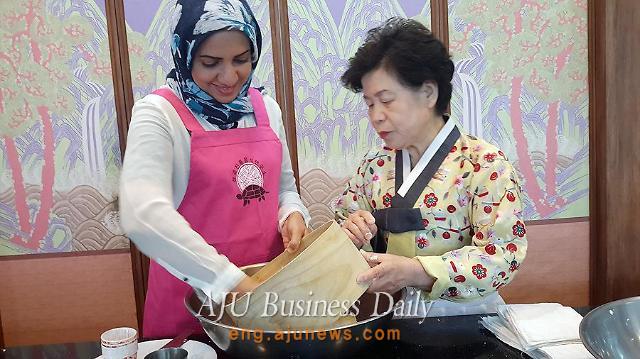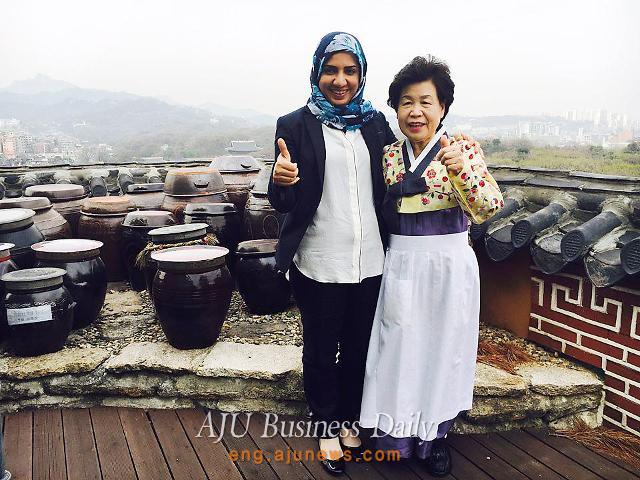
Mansoora A. Ammer Al-Jamri is learning how to make 'Hobak-Tteok', a pumpkin rice cake [Aju News DB]
At first, she was not sure if the first Korean food served to her was non-halal and free of ingredients that are not permissible under Islamic law.
Mansoora A. Ammer Al-Jamri, a journalist from Bahrain's Al Wasat, recalled she was nervous when she was treated to a Korean dish earlier this month at a restaurant in Seoul. She was invited to Seoul by the Korean Culture and Information Service of the Ministry of Culture, Sports and Tourism as a part of a cultural program.
But her worries soon disappeared as soon as she visited the Korea Agro-Fisheries Trade Corporation's (AFTC) export division. The food export division literally exports not only Korean food but halal food as well. The main export destination is the Middle East.
A series of researches led the AFTC to realize that that Korean food is getting popular around the world except for the Middle East. The AFTC soon found out that because of Korean food are mostly non-halal, so only a limited number of locals were able to eat exported Korean food due to religious reasons.
Now, the AFTC's exports division has signed an MOU with the UAE to export halal food certified by the Korean Muslim Federation, Indonesia and Malaysia's government branch, and the branches of other well known Muslim countries.
The AFTC official told Mansoora: "Although it is not easy for the newcomer like us to enter the Middle Easts market with halal food, we expect increased exports in the next few years." "Consumers in the Middle East prefer the very unique taste, quite different from South East Asia's. Their preference is more similar to that of Europeans."
"We are encouraging companies to jump into the halal market and get certified. We plan to do so by increasing the money that we support and open food expos dedicated to Korean food."
The main kinds of Korean food which are halal certified and being exported are noodles, drinks, kimchi, and Tteok-bokki (stir fried rice cake).
Also, Mansoora took a second lesson of making Korean cuisine all by herself. This time, it was "Hobak-Tteok", a pumpkin rice cake. The journalist was surprised by the fact that she never came across Korean style dessert during her stay, and was very eager to make it with her own hands.

Mansoora A. Ammer Al-Jamri is posing for a photograph with Lee Myung-sook, the President of the Institute of Traditional Korea Food [Aju News DB]
The lesson was given by Lee Myung-sook, the president of the Institute of Traditional Korea Food. The institute was established by the Ministry of Food, Agriculture, Forestry and Fisheries.
"Many foreign students ask if there's any Korean dessert," said Lee, "Of course, there are. There are more than 200 kinds of Tteok (rice cake) and 250 kinds of Hangwa (Korean style biscuits). Plus, we are working very hard to add new menus to our recipes. All of them are well-balanced in nutrients." she explained.
"The Hobak-Tteok looked like a muffin," Mansoora wrote in her report. It was sweet but light, and she ate two pieces of the rice cake. Lee also prepared a few Hobak-Tteok. "It was a Korean tradition of hospitality," she recalled. "The departing must not be empty-handed."
아주경제 박세진 기자 = swatchsjp@ajunews.com




